Diabetes Management
Decoding Food Labels for Effective Diabetes Management
2 min read
By Apollo 24|7, Published on - 11 March 2024
Share this article
0
0 like

Informed food choices are crucial in managing diabetes, and they start with deciphering the information on food packs. But how do you interpret all those percentages, grams, and nutrient claims? Let's break down the key aspects.
Decoding Nutrient Claims
It's important to clearly understand food labels that indicate the amount of fat in the product, such as 'fat-free,' 'low fat,' or 'reduced fat.' These terms' meanings can be complicated and require appropriate contextualization. For instance, a product labeled as
- Fat-free: should contain less than 0.5 grams of fat per serving,
- Low fat: should contain no more than 3 grams of fat per serving,
- Reduced fat: products should have at least 25% less fat than the regular version.
Knowing these definitions can help you make an informed decision about the nutritional value of your food product.
Nutrient Guidelines for Diabetes Management
As per dietary guidelines:
- Limit nutrients like sodium and saturated fat to less than 5% of your daily caloric intake.
- Aim for 20% or more essential nutrients like fibers, proteins, and specific vitamins and minerals.
- Monitor sugar alcohols and complex carbohydrates, which can significantly impact blood sugar levels.
Ingredient Lists: A Peek into What You're Eating
Ingredients are listed by weight, from highest to lowest. Beware of added sugars and unhealthy ingredients listed at the top. The presence of such components in large amounts can harm your health. Knowing the ingredients helps make healthy choices like increasing fiber (look for words, whole grain, whole wheat, etc.) or decreasing sugar (look for words, cane sugar, agave, maple syrup, honey, etc.).
Demystifying Percent Daily Values
The Percent Daily Values (%DV) indicate what percent of each nutrient the food provides based on a 2,000-calorie-per-day diet. Understanding these values allows you to make better nutritional choices that align with your dietary needs.
The Importance of Serving Size
Note that the serving size listed on labels impacts your calorie intake. To manage your food consumption effectively, distinguish between serving size (the standardized amount for comparing nutrients) and portion size (the amount of food you choose to eat at one time).
Deciphering Calories and Nutrients
Understanding the calorie content, the breakdown of nutrients, and the % Daily Value is vital. These values directly influence your energy intake and nutritional balance. Adjust them based on your individual needs, especially if you have diabetes.
In conclusion, reading and understanding food labels can dramatically improve your ability to manage diabetes. It equips you with the knowledge to make healthier choices and take control of your condition. So, the next time you pick up a food item, remember to flip it over and check the label!
Diabetes Management
Consult Top Diabetologists
View AllLeave Comment
Recommended for you
.jpg?tr=q-80)
Diabetes Management
Family Gathering Tips for Individuals with Diabetes
Family gatherings need not be a source of stress for individuals managing diabetes. With mindful eating, maintaining routine, and making smart food choices, you can enjoy these events while keeping your health in check. For additional support on managing type 2 diabetes, consider enrolling in a structured programme such as the Apollo Super 6.

Diabetes Management
Medicines for Diabetes and their Side-effects
For medication-dependent people with diabetes, management involves understanding the impact of their prescription medicines, such as metformin, sulphonylureas, and DPP-4 inhibitors, as well as their possible side effects. Regularly tracking of health indicators using a reliable diabetes management app complements their medication in maintaining optimal blood sugar levels. With proper knowledge and tools, living well with diabetes is a definite possibility.

Diabetes Management
Can Diabetes Affect Your Recovery?
Diabetes impacts recovery, leading to delayed healing, infection risks, and surgical complications due to impaired blood flow and immune function. Neuropathy complicates pain management, while comorbidities extend recovery times. Effective management, including blood sugar control and a healthy lifestyle, improves outcomes. High blood sugar limits healing by reducing nutrient flow and immunity, promoting inflammation.
Subscribe
Sign up for our free Health Library Daily Newsletter
Get doctor-approved health tips, news, and more.
Visual Stories

8 Fruits That are Incredibly Healthy for Diabetes
Tap to continue exploring
Recommended for you
.jpg?tr=q-80)
Diabetes Management
Family Gathering Tips for Individuals with Diabetes
Family gatherings need not be a source of stress for individuals managing diabetes. With mindful eating, maintaining routine, and making smart food choices, you can enjoy these events while keeping your health in check. For additional support on managing type 2 diabetes, consider enrolling in a structured programme such as the Apollo Super 6.

Diabetes Management
Medicines for Diabetes and their Side-effects
For medication-dependent people with diabetes, management involves understanding the impact of their prescription medicines, such as metformin, sulphonylureas, and DPP-4 inhibitors, as well as their possible side effects. Regularly tracking of health indicators using a reliable diabetes management app complements their medication in maintaining optimal blood sugar levels. With proper knowledge and tools, living well with diabetes is a definite possibility.

Diabetes Management
Can Diabetes Affect Your Recovery?
Diabetes impacts recovery, leading to delayed healing, infection risks, and surgical complications due to impaired blood flow and immune function. Neuropathy complicates pain management, while comorbidities extend recovery times. Effective management, including blood sugar control and a healthy lifestyle, improves outcomes. High blood sugar limits healing by reducing nutrient flow and immunity, promoting inflammation.


